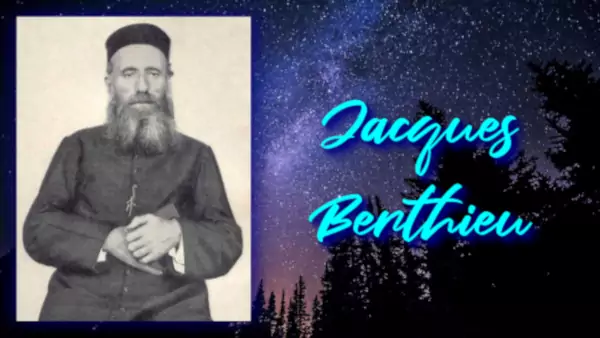08 June - Born of solid and austere Auvergne peasants on the Montlogis (Polminhac) estate, Jacques Berthieu completed his secondary school studies at the Pleaux minor seminary before moving on to the Saint-Flour (Cantal) major seminary to prepare for the priesthood.
Ordained priest on May 21, 1864 for the diocese of Saint-Flour, he was appointed vicar of Roannes-Saint-Mary. Badly accepted by the parish priest (who was waiting for the appointment of another), Berthieu showed patience and adapted to the situation. Wishing to leave for a mission country, he asked for admission to the Society of Jesus. While his bishop was planning to appoint him parish priest, he entered the novitiate in Pau on October 31, 1873: he was 35 years old. In 1874, he was at the scholasticate at Vals-près-le-Puy for a brief "call" to the philosophy course. In contact with Henri Ramière who was there, he developed a deep devotion to the Sacred Heart.
In 1875, the RP. Berthieu is sent to Reunion Island from where he soon moves to Sainte-Marie (today: Nosy Boraha), an island off the northeast coast of Madagascar, to study the Malagasy language. Together with two other Jesuits and the Sisters of Saint Joseph of Cluny, he forms a dynamic missionary team. He did pastoral work there for five years, until March 1880.
On March 29, 1880 the Jesuits are expelled from all French territories. This forced Berthieu to move to the large island of Madagascar, then an independent kingdom. He worked there as a missionary among the Betsileo in the district of Ambohimandroso, south of Antananarivo, from 1881 to 1883. During the first Franco-Malagasy war (1881-1885), French citizens are arrested and gathered in concentration camps: the RP. Berthieu thus found himself in Toamasina where he volunteered as a military chaplain. Once his faith was liberated, he was appointed in the district of Ambositra. From 1886 to 1891, he directed the Catholic mission there and increased the number of missionary posts (from 6 to 15). School education is of particular interest to him.
In 1891, Berthieu was sent north of Antananarivo, to Andrainarivo (Anjozorofady) where he was given responsibility for two posts. The situation there was often delicate; rivalries between Protestants and Catholics were fierce. In addition, tension is rising between France and Madagascar. French colonialist pressure led to an ultimatum (1894) which was rejected. A second Franco-Malagasy colonial war (1894-1895) ensues and ends with the imposition of a French protectorate humiliating for the Malagasy people. During this war, the missionary was forced to withdraw to Reunion Island.
Back on the big island, in Ambatomainty, Berthieu is quickly caught up in the convulsions of the violent political-religious insurrection - opposition to Christianity as well as to the French government - of the Menalamba movement opposed to the 1895 agreement and the idea of a protectorate. In May 1896 the rebellion broke out. Christians are often threatened because the expansion of Christianity is perceived as weakening the power of idols and other fetishes that support the power of the traditional authorities. Berthieu sought to place his Christians under the protection of French troops. Forced by military power to be evacuated, an entire Christian village sets out, under the leadership of Father Jacques Berthieu, its pastor, who does not want to abandon his flock; he heads for Antananarivo. Poorly protected by the soldiers of Colonel Combes (very ill-disposed towards Berthieu because he had not hesitated to reproach him for immoral acts), the column of villagers was attacked by the Menalamba on June 7, 1896. Like the Christians he accompanied, Berthieu was arrested and subjected to ill-treatment.
At once fanatical, cruel and fearful (fear of the power of Berthieu's "amulets" which are his rosary and crucifix ...) the insurgents decided to take him to their leader, Rabozaka, about fifteen kilometres away. For Berthieu, already wounded and bleeding, this long march is a calvary. Several times he is offered to abandon his religion, to "communicate his power", and thus to have his life saved: "we will make you a leader". Berthieu refused: "I cannot consent to that; I prefer to die".
Passing through Ambohitra, a Christian post with its school, church and a small presbytery, Berthieu asked the Christians to give him a lamba (garment) because he had been stripped of his people, and he was cold. Terrorized, the Christians did nothing. He also asked for permission to visit the church where he had often celebrated mass. His guards refused him. He simply knelt down in front of the door and recited aloud the Our Father. The procession then continues on its way. Three more kilometers on a steep and very difficult uphill road, and Berthieu can't take it anymore. We arrived in Ambiatibe, some 60 km from Antananarivo.
On the evening of June 8, Berthieu has no strength left. Moreover, the insurgents are wondering whether the father, with his powerful amulets, will not contaminate the idols in the camp where he is being taken. So they decide to do away with him. Taken about 50 metres from the village of Ambiatibe, he is shot. At the fifth shot, the RP. Berthieu is dead. As he seemed to be still looking at them on his knees, his head was smashed with a club. At dusk, his body is thrown into a nearby river, the Mananara. He will never be found. Of the six murderers of St. James Berthieu, the French shot three. Of the other three, Father Théophile Weber, a native of Alsace (Rorschwihr), a missionary in the district where Father Berthieu was martyred, confessed one shortly before his death and baptized two.
Jacques Berthieu was beatified on 17 October 1965 by Pope Paul VI during the Second Vatican Ecumenical Council and canonized on 21 October 2012, Mission Sunday, by Pope Benedict XVI.








